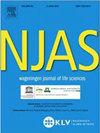Conceptualising the DAIS: Implications of the ‘Digitalisation of Agricultural Innovation Systems’ on technology and policy at multiple levels
Abstract
As digitalisation transforms agriculture, the implications of cumulative innovation processes are essential to consider in order to mitigate risk and capitalise on opportunities. One project that involves imagining the future of the sector and aims to develop the necessary tools and infrastructure is the Australian Commonwealth Scientific and Industrial Research Organisation (CSIRO) Digiscape Future Science Platform (FSP). This paper explores the policy framework encompassing these technologies and elucidates considerations for future governance in Australia and beyond. Conceptually, we draw on Agricultural Innovation Systems (AIS) theorisation in the context of implications of digital technological development on policy. Methodologically, we utilise multi-level exploratory interviews with Digiscape FSP and prawn aquaculture value chain stakeholders. We argue society is at a critical point in time when the implications of digital agriculture need to be considered at broader regime and landscape levels. Questions around data privacy and ownership are prevalent in agricultural settings, although appropriate institutional guidance is lacking. Three propositions are made as a result of the analysis of scoping research involving innovation community stakeholders. We suggest that agricultural industries stand to benefit from the ‘Digitalisation of Agricultural Innovation Systems’ ex ante socio-technical transition, what we introduce as the DAIS, if forums for discussion and associated technological policy are enacted with emphasis placed on the underlying values of society-technology interaction.

 求助内容:
求助内容: 应助结果提醒方式:
应助结果提醒方式:


